Austin L Hughes is an evolutionary biologist who believes that science is not adequate to the task of answering all questions. He wrote an article for The New Atlantis that has become the manifesto for people who accept the limitations of science and reject scientism. This may be one of his most important contributions.
Scientism is the belief that science alone can answer all questions and any questions that cannot be answered by science are not important questions. Philosophically speaking, this idea was first advocated by Logical Positivists in the early 20th century.
Logical Positivism can be traced to the Vienna Circle (1922), a group of philosophers in Austria who held that experience is the only source of knowledge, and logical analysis using symbolic logic is the proper method for solving philosophical problems. Logical Positivism was popularized in Great Britain by A. J. Ayer and in the United States by Rudolf Carnap.
Logical Positivism held two key beliefs: (1) absolute confidence in empirical experience as the only source of knowledge; and (2) logical analysis performed with the help of symbolic logic is the single method for solving philosophical problems. This group of philosophers attempted to exclude metaphysics from philosophical investigation in favor of strict logical and mathematical analysis. They also stripped ethics of important aspects, such as conscience, intuition, emotion, sense of duty, moral categories of right and wrong, good and evil, etc. The result was a materialist skepticism about all truth claims. Hughes argued that such people must ultimately deny their own truth claims.
Read this interview with Austin L Hughes. He first became aware of the intolerance of scientism while doing graduate studies at Harvard. Hughes had been a Philosophy major at Georgetown University before going to Harvard. He recognized that what was being hailed as science at Harvard was really the philosophical heir to logical positivism.
Austin Hughes died on October 31, 2015 in Columbia, South Carolina. He was 66. He was a Roman Catholic and he often helped the priest of his church distribute Holy Communion.
Here are some remarks about him and the importance of his work:
“The premature death of Austin came as a shock to the Department of Biological Sciences at USC. He was a world renowned scholar and a much-liked teacher and colleague.
His scholarly work is known all over the world, and has been cited more than 9,000 times by other scientists. He was a Carolina Distinguished Professor and we had just nominated him for the SC Governor's Award for Scientific Excellence.
When Austin started teaching courses in Domestic Animal Nutrition and Bird Biology, he quickly gained a reputation as an excellent and passionate teacher who cares for his students. In the words of one of his student evaluators: Dr. Hughes is one of the best biology professors I've had at USC.
We are saddened by the tragic passing of Austin. He will leave a gap that will be difficult to fill. Our heartfelt condolences go to his wife Andrea and his family. We wish you much strength to go through these difficult times." -- For the Biology Department at USC, Johannes Stratmann, Chair
"It is impossible to exaggerate the importance Austin Hughes’ fundamental contributions to molecular evolutionary theory and practice. He was a prolific researcher whose work covered such disparate topics as coevolution, phylogenetics, repetitive DNA, and more recently the application of population genetics to clinical research. Austin had an incredibly sharp mind, an imitable scientific intuition, and an abundance of impatience for bad science, faulty logic, and demagoguery. Debunking unwarranted generalizations and “accepted” theories was one of his fortes. His writing was crystal clear; I wish he had written a manual of writing style for scientists. He was also fluent in the Welsh language (Cymraeg) and wrote both poetry and prose in this ancient tongue. His untimely death deprived me of a friend and colleague; science was deprived of a great biologist who knew living systems inside and out at all levels, from the molecular to ecological. I’ll miss you, Austin. Gorffwys mewn hedd." —Dan Graur, University of Houston
"Austin Hughes was that rarest of rare birds in academia: a distinguished scientist with the soul of a humanist. At the foundation of his scientific labors was a philosophical and, indeed, theological conviction: the supreme importance of seeking and attaining truth. It was this that motivated and sustained his work. And because he was aware that this (only) rational motivation for scientific inquiry is not itself something that can be grasped by deploying scientific methods, he eschewed philosophical empiricism and scientific reductionism. He knew that non-scientific methods of inquiry are as necessary as scientific ones in the House of Intellect. For Austin, scientists and humanists were—are—not inhabitants of “two cultures,” much less “cultures in conflict”; they are, rather, friends and collaborators in the comprehensive project of truth seeking. —Robert P. George, Princeton University
I remember Austin fondly—an unusual individual to say the least. He held deep religious convictions and yet was a rigorous scientist. I would call Austin, talk to him about whatever subject, and he would come up with some form of analysis. He was a rare scientist who bridged both biology and computing; his passing is such a loss to the field. Not that his relationship with my lab members was always plain sailing. His intolerance of naïve graduate students was legendary! I would ask them, with a smile on my face, to talk to Austin about their ideas. Almost always, they would be back in my office, despondent and demoralized! But once they got to know Austin, their disposition would change. I never, ever, had a single issue with Austin. Always ready and excited to help with new analyses, and entertaining to talk to—really a wonderful colleague and friend.
—David I. Watkins, University of Miami
Related reading: The Trouble With Scientism; The Arrogance of Scientism


No comments:
Post a Comment